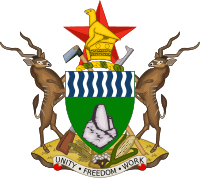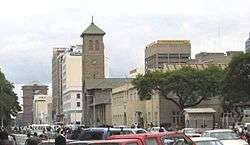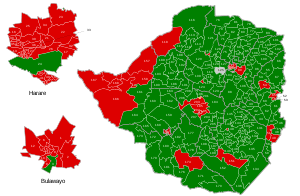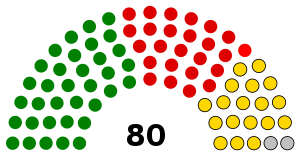Politics of Zimbabwe
The politics of Zimbabwe takes place in a framework of a full presidential republic, whereby the President is the head of state and government as organized by the 2013 Constitution. Executive power is exercised by the government. Legislative power is vested in both the government and parliament. The status of Zimbabwean politics has been thrown into question by a 2017 coup.
 |
|---|
| This article is part of a series on the politics and government of Zimbabwe |
|
Legislature |
|
Judiciary |
Political developments since the Lancaster House Agreement
The Zimbabwean Constitution, initially from the Lancaster House Agreement a few months before the 1980 elections, chaired by Lord Carrington, institutionalises majority rule and protection of minority rights. Since independence, the Constitution has been amended by the government to provide for:
- The abolition of seats reserved for whites in the country's parliament in 1987;[1]
- The abolition of the office of prime minister in 1987 and the creation of an executive presidency.[1] (The office was restored in 2009, and abolished again in 2013.)
- The abolition of the Senate in 1990 (reintroduced in 2005), and the creation of appointed seats in the House of Assembly.[1]
The elected government controls senior appointments in the public service, including the military and police, and ensures that appointments at lower levels are made on an equitable basis by the independent Public Service Commission.
ZANU-PF leader Robert Mugabe, elected prime minister in 1980, revised the constitution in 1987 to make himself president. President Mugabe's affiliated party won every election from independence on April 18, 1980, until it lost the parliamentary elections in March 2008 to the Movement for Democratic Change. In some quarters corruption and rigging elections have been alleged. In particular the elections of 1990 were nationally and internationally condemned as being rigged, with the second-placed party, Edgar Tekere's Zimbabwe Unity Movement, winning only 20% of the vote. Presidential elections were held in 2002 amid allegations of vote-rigging, intimidation, and fraud, and again in March 2008.
Ethnic rivalry between the Shona and Ndebele has played a large part in Zimbabwe's politics, a consequence of the country's borders defined by its British colonial rulers. This continued after independence in 1980, during the Gukurahundi ethnic cleansing liberation wars in Matabeleland in the 1980s. This led to the political merger of Joshua Nkomo's Zimbabwe African People's Union (ZAPU) with the ruling Zimbabwe African National Union (ZANU) to form ZANU-PF and the appointment of Nkomo as vice president.
During 2005, with Mugabe's future in question, factionalism within the Shona has increased.[2] In October 2005 it was alleged that members of the ruling ZANU-PF and the opposition MDC had held secret meetings in London and Washington to discuss plans for a new Zimbabwe after Robert Mugabe.[3] On February 6, 2007, Mugabe orchestrated a Cabinet reshuffle, ousting ministers including 5-year veteran Minister of Finance Herbert Murerwa.
Political conditions
Since the defeat of the constitutional referendum in 2000, politics in Zimbabwe has been marked by a move from the norms of democratic governance, such as democratic elections, the independence of the judiciary, the rule of law, freedom from racial discrimination, the existence of independent media, civil society and academia. Recent years have seen widespread violations of human rights.
Elections have been marked by political violence and intimidation, along with the politicisation of the judiciary, military, police force and public services.[4] Statements by the President and government politicians have referred to a state of war, or Chimurenga, against the opposition political parties, in particular the Movement for Democratic Change – Tsvangirai (MDC-T). Newspapers not aligned with the government have been closed down, members of the judiciary have been threatened and/or arrested. Repressive laws aimed at preventing freedoms of speech, assembly and association have been implemented and subjectively enforced. Members of the opposition are routinely arrested and harassed, with some subjected to torture or sentenced to jail. The legal system has come under increasing threat. The MDC has repeatedly attempted to use the legal system to challenge the ruling ZANU-PF, but the rulings, often in favour of the MDC, have not been taken into account by the police.
Branches
Political power in Zimbabwe is split between three branches, the executive, the legislative and the judicial branches, with President as the head of the executive branch, the Prime Minister the head of the legislative branch and the Chief Justice of the Supreme Court of Zimbabwe the head of the judicial branch.
The Minister of State for Presidential Affairs is a non-cabinet ministerial position in the government of Zimbabwe. The incumbent is Didymus Mutasa.[5] The duties of the position have yet to be publicly defined.
Executive
| Office | Name | Party | Since |
|---|---|---|---|
| President | Emmerson Mnangagwa | ZANU-PF | 24 November 2017 |
| Vice-President | Constantino Chiwenga & Kembo Mohadi | ZANU-PF | 28 December 2017 |
Under Zimbabwe's Constitution, the president is the head of state, government and commander-in-chief of the defence forces, elected by popular majority vote. Prior to 2013, the president was elected for a 6-year term with no term limits. The new constitution approved in the 2013 constitutional referendum limits the president to two 5-year terms, but this does not take effect retrospectively (Robert Mugabe had held the office from 1987 to 2017).
The Cabinet is appointed by the president and responsible to the House of Assembly.
Legislature

Parliament consists of the House of Assembly and, since 2005, the Senate, which had previously been abolished in 1990. The House of Assembly has 210 members elected by universal suffrage, including the Speaker, and the Attorney General, and may serve for a maximum of five years.[6] Under the 2013 constitution, the Senate consists of 80 members, of whom 60 are elected for five-year terms in 6-member constituencies representing one of the 10 provinces, elected based on the votes in the lower house election, using party-list proportional representation, distributed using the hare quota. Additionally the Senate consists of 2 seats for each non-metropolitan district of Zimbabwe elected by each provincial assembly of chiefs using SNTV,[7] 1 seat each for the president and deputy president of the National Council of Chiefs and 1 male and 1 female seat for people with disabilities elected on separate ballots using FPTP by an electoral college designated by the National Disability Board.[8][9]
Judicial
The judiciary is headed by the Chief Justice of the Supreme Court of Zimbabwe who, like their contemporaries, is appointed by the President on the advice of the Judicial Service Commission. The Constitution has a Bill of Rights containing extensive protection of human rights. The Bill of Rights could not be amended for the first 10 years of independence except by unanimous vote of Parliament.
The Supreme Court is the highest court of order and the final court of appeal. The Chief Justice is the senior judge. Others who sit on the bench of the Supreme Court of Zimbabwe are Justice Paddington Garwe, former Judge-President of the High Court, Wilson Sandura and Vernanda Ziyambi. Luke Malaba, a former justice of the Supreme Court, was appointed acting chief justice on 1 March 2017 following the retirement of Chief Justice Godfrey Chidyausiku. Malaba was promoted to chief justice on 28 March.[10]
The legal system is based on Roman-Dutch law with South African influences. A five-member Supreme Court, headed by the Chief-Justice has original jurisdiction over alleged violations of fundamental rights guaranteed in the constitution and appellate jurisdiction over other matters. There is a High Court consisting of general and appellate divisions. Below the High Court are regional magistrate's courts with civil jurisdiction and magistrate's courts with both civil and criminal jurisdiction over cases involving traditional law and custom. Beginning in 1981, these courts were integrated into the national system.
List of Chief Justices:
| Incumbent | Tenure | Notes | |
|---|---|---|---|
| Took office | Left office | ||
| Hector Norman MacDonald | 1977 | May 1980 | Appointed by Ian Smith (Rhodesia under UDI) |
| Sir John Fieldsend [11] | 1 July 1980 | 1983 | |
| Enoch Dumbutshena | February 1984 | 1990 | |
| Anthony Gubbay | 1990 | 2001 | |
| Godfrey Chidyausiku | 2001 | 2017 | |
| Luke Malaba[10] | 2017 | present | |
Political parties and elections
Presidential elections
1991 Zimbabwean general election
House of Assembly elections

.svg.png) | |||||||
|---|---|---|---|---|---|---|---|
| Party | Votes | % | Seats | ||||
| Common | Women | Total | +/– | ||||
| ZANU–PF | 2,477,708 | 52.35 | 144 | 35 | 179 | –17 | |
| Movement for Democratic Change Alliance | 1,624,875 | 34.33 | 64 | 24 | 88 | +16 | |
| MDC–Tsvangirai (Khupe) | 161,824 | 3.42 | 0 | 1 | 1 | New | |
| People's Rainbow Coalition | 61,644 | 1.30 | 0 | 0 | 0 | New | |
| National Patriotic Front | 49,103 | 1.04 | 1 | 0 | 1 | New | |
| Zimbabwe Partnership for Prosperity | 26,515 | 0.56 | 0 | 0 | 0 | New | |
| Zimbabwe African People's Union | 16,088 | 0.34 | 0 | 0 | 0 | 0 | |
| Zimbabwe Democratic Union | 11,199 | 0.24 | 0 | 0 | 0 | New | |
| National Constitutional Assembly | 9,736 | 0.21 | 0 | 0 | 0 | New | |
| Mtwakazi Republic Party | 9,554 | 0.20 | 0 | 0 | 0 | New | |
| Build Zim Alliance | 8,486 | 0.18 | 0 | 0 | 0 | New | |
| Coalition of Democrats | 6,522 | 0.14 | 0 | 0 | 0 | New | |
| FreeZim Congress | 4,303 | 0.09 | 0 | 0 | 0 | 0 | |
| United Democratic Alliance | 3,599 | 0.08 | 0 | 0 | 0 | New | |
| Republican Party of Zimbabwe | 3,264 | 0.07 | 0 | 0 | 0 | New | |
| Freedom Movement #1980 | 2,146 | 0.05 | 0 | 0 | 0 | New | |
| Alliance for the Peoples Agenda | 2,111 | 0.04 | 0 | 0 | 0 | New | |
| United African National Council | 1,889 | 0.04 | 0 | 0 | 0 | New | |
| The African Democrats | 1,387 | 0.03 | 0 | 0 | 0 | New | |
| United Movement for Democracy | 1,357 | 0.03 | 0 | 0 | 0 | 0 | |
| Alliance for National Salvation | 1,204 | 0.03 | 0 | 0 | 0 | New | |
| Zimbabwe Rainbow Democratic Party | 1,172 | 0.02 | 0 | 0 | 0 | New | |
| People's Progressive Party Zimbabwe | 1,064 | 0.02 | 0 | 0 | 0 | New | |
| Freedom Justice Coalition Zimbabwe | 773 | 0.02 | 0 | 0 | 0 | New | |
| United Democratic Front | 611 | 0.01 | 0 | 0 | 0 | New | |
| PRZ | 494 | 0.01 | 0 | 0 | 0 | New | |
| Zimbabwe Labour Party | 464 | 0.01 | 0 | 0 | 0 | New | |
| Zimbabwe Patriotic Movement | 402 | 0.01 | 0 | 0 | 0 | New | |
| Zim First | 373 | 0.01 | 0 | 0 | 0 | New | |
| National Action Party | 362 | 0.01 | 0 | 0 | 0 | New | |
| Rebuilding Zimbabwe Party | 346 | 0.01 | 0 | 0 | 0 | New | |
| Maat – Zimbabwe | 342 | 0.01 | 0 | 0 | 0 | New | |
| Zimbabwe People's Party: Good People's Movement | 328 | 0.01 | 0 | 0 | 0 | New | |
| Democratic Official Party | 323 | 0.01 | 0 | 0 | 0 | New | |
| United Democracy Movement | 318 | 0.01 | 0 | 0 | 0 | New | |
| Forces of Liberation Organization of African National Party | 303 | 0.01 | 0 | 0 | 0 | New | |
| Chief's Party | 282 | 0.01 | 0 | 0 | 0 | New | |
| United Crusade for Achieving Democracy Green Party of Zimbabwe | 224 | 0.00 | 0 | 0 | 0 | New | |
| Unity Party Zimbabwe | 214 | 0.00 | 0 | 0 | 0 | New | |
| New Zimbabwe Republican Party | 198 | 0.00 | 0 | 0 | 0 | New | |
| Federal Democrats of Zimbabwe | 194 | 0.00 | 0 | 0 | 0 | New | |
| ERA | 177 | 0.00 | 0 | 0 | 0 | New | |
| Democratic Alliance–United People's Party | 147 | 0.00 | 0 | 0 | 0 | New | |
| Progressive Democrats of Zimbabwe | 144 | 0.00 | 0 | 0 | 0 | New | |
| United Christian Alliance | 123 | 0.00 | 0 | 0 | 0 | New | |
| African People's Congress | 70 | 0.00 | 0 | 0 | 0 | New | |
| Suffering Voices of Zimbabwe | 66 | 0.00 | 0 | 0 | 0 | New | |
| Freedom Front | 44 | 0.00 | 0 | 0 | 0 | 0 | |
| Independents | 238,179 | 5.03 | 1 | 0 | 1 | –1 | |
| Invalid/blank votes | – | – | – | – | – | ||
| Total | 4,732,851 | 100 | 210 | 60 | 270 | 0 | |
| Registered voters/turnout | – | – | – | – | |||
| Source: ZEC | |||||||
Senate elections
 | |||
|---|---|---|---|
| Party | Seats | +/– | |
| ZANU–PF | 34 | –3 | |
| Movement for Democratic Change Alliance | 25 | +2 | |
| MDC–Tsvangirai (Khupe) | 1 | New | |
| Chiefs | 18 | – | |
| People with disabilities | 2 | – | |
| Total | 80 | 0 | |
| Source: ZBC | |||
Administrative division
Main articles: Provinces of Zimbabwe, Districts of Zimbabwe
Zimbabwe is divided into eight provinces, each administered by a provincial governor appointed by the President. The provincial governor is assisted by the provincial administrator and representatives of several service ministries. The provinces are further divided into 63 districts.
International organization participation
ACP, AfDB, C (former), ECA, FAO, G-15, G-77, IAEA, IBRD, ICAO, ICCt (signatory), ICFTU, ICRM, IDA, IFAD, IFC, IFRCS, ILO, IMF, Interpol, IOC, IOM, ISO, ITU, NAM, OAU, OPCW, PCA, PMAESA, SADC, UN, UNCTAD, UNESCO, UNIDO, UNMIK, UPU, WCL, WCO, WFTU, WHO, WIPO, WMO, WToO, WTrO
References
- Zimbabwe Moves to Limit Whites' Role : Legislation Prepared to End a Guarantee of Parliament Seats, Los Angeles Times, June 24, 1987.
- Archived copy at the Library of Congress (April 14, 2005).
- "The end of Mugabe?". openDemocracy. 2005-10-13. Archived from the original on 2012-01-15. Retrieved 2011-12-31.
- Archived March 22, 2006, at the Wayback Machine
- "New Cabinet appointed". The Herald (Zimbabwe). 13 Feb 2009. Archived from the original on 2009-02-16. Retrieved 2009-02-13.
- "Zimbabwe's Mugabe Finalizes Constitutional Amendment On Elections", Carole Gombakomba, VOA News, November 1, 2007.
- "Part X, Section 44". ELECTORAL ACT (pdf). Zimbabwe Electoral Commission. p. 35. Retrieved 18 January 2015.
- "3, 4". Constitution of Zimbabwe Amendment (No. 20) (PDF). pp. 52–54. Archived from the original (pdf) on 2014-09-10.
- "Electoral Amendment Act 2014 [Act 6-2014]" (doc). Veritas Zimbabwe. pp. 52–55. Retrieved 18 January 2015.
- Zharare, Herbert; Kachere, Phyllis. "Malaba appointed Chief Justice | The Herald". www.herald.co.zw. Retrieved 1 April 2017.
- "THE LIGHT OF SUCCESSIVE CHIEF JUSTICES OF ZIMBABWE IN SEEKING TO PROTECT HUMAN RIGHTS AND THE RULE OF LAW" (PDF). MIRIAM ROTHSCHILD AND JOHN FOSTER HUMAN RIGHTS TRUST. Retrieved 26 February 2016.